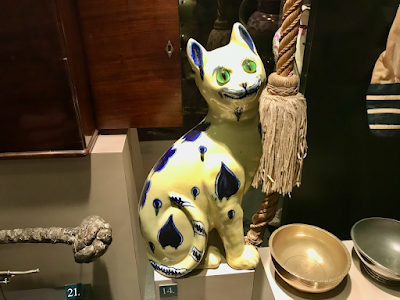I picked up the Labyrinth game (by Ben Milton and Jack Caesar) about a year ago at a local game store, not having heard much about it. I loved the movie when it came out, if that dates me as Gen X then congratulations, yes, yes, you are very smart. Shut up.
That said, I weary of the reverence we try to inflict on newer generations in regard to our formative media. Passing on Goonies and Star Wars and Ghostbusters with trembling hands and hushed voices like they were sacraments, basking in our precisely targeted market of smug nostalgia.
I don't want to be that guy.
But still, I figured I would have fun reading the game, maybe play it with the kid when he got old enough.
Flash forward to now, the kid is a prodigal 4 year old and pulls it off the shelf, demanding I play it.
Generational aesthetic dilemma averted. :)
Overall
On the whole I have been enjoying it, and my kid keeps asking to play. The game consists of many short scenarios in a random path through the game, most of which are good fun. This is both a positive and negative - it makes for a different game each time, but it is also hard to prepare for. I imagine there are people who will read this
book end to end before running it. I am not one of them. For me, there is a notable
pause between the point where I read the intro to each page and
when I actually start. Fortunately while the room descriptions are a bit
wordy, none of them are too long.
System
I
like the rules-lite
system it includes, and feel like it meshed with the scenarios nicely.
There's not a lot to it, just roll a d6 - two if you have advantage or
disadvantage for whatever reason. Everything you really need fits on the
little paper book mark. Anything more would have probably
been
a bit much and there is already plenty of dice trickery within many of
the scenarios. Also, because it is so minimal, the effects of many
potions and items need no elaboration - they either do a specific thing
or grant advantage/disadvantage, making them easy to adjudicate on the
fly.
Play
The conceit of skipping through like a sort of choose-your-own adventure took a little getting used to. I ended up making small changes like not rolling to backtrack.
Some
of the scenarios were a little opaque. This is to say that to pass into
the next room often required the party to know things they had no
obvious reason to. Usually this meant we had to backtrack and find another way. Often, finding an item afterwards gave us a new means to get past a seemingly impassible area, which is a nice touch.
We loved the Fortune Teller scenario every time it came up, and backtracked often to get another reading. These were things like "I see you buried deep below!" or "I see a giant made small!" There's even a mechanical benefit you can call on if a fortune actually takes place, letting you save precious time (fitting!). I suspect some of these are also hints to later puzzles. Overall a really well done and enjoyable scene.
By contrast, the Balloons scenario fell a little flat. There is a lot of potential here for climbing up the balloons, struggling with the goblins, reaching the highest balloon for an overview, etc. Problem is there is no apparent reason to do any of that. The balloons are not going anywhere and, while a threat due to projectiles, can be ignored. For what it is worth, the kid liked to find out what the goblins would throw out of them, and got a goblin helmet out of it. While I list this as a criticism, it also makes me wonder whether every scenario in this book really needs an obvious reason to engage. Could some scenarios be appreciated as mere interesting events that don't necessarily lead toward the goal?
The Buried Giant was memorable because it is one of those seemingly impassible scenarios mentioned before. We found a solution in one of the potions you can get, and backtracked to this area to use it. It worked and we finally passed, it was a real victory and this made me understand why so many of these pages did not provide a solution in the text.
We tended to skip over The Gatekeepers in the beginning, as the choices seemed forced and a bit game-y for my taste.
We have not made it to the Goblin King yet, maybe never will. There is a lot else to do.
Presentation
It's a nice enough book and the art is good. I didn't have the problem some people report about the pages falling apart. Some were a little dinged and smudgy from the printer. The dice slot is a little annoying but does keep the dice around in the book between uses.
You can buy it Amazon or a local game store. Please patronize the game store instead.
And that's my experience with it so far. Tell me about your experiences or ask questions about mine!













